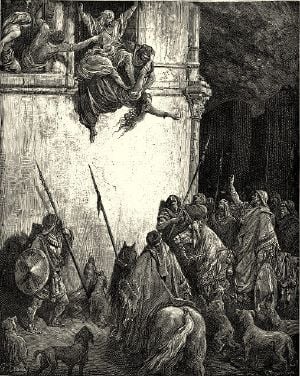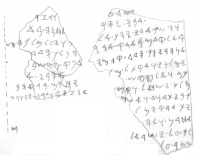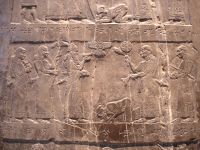Difference between revisions of "Jehu" - New World Encyclopedia
m (→j.e.) |
m (→article) |
||
| Line 6: | Line 6: | ||
the son of Jehoshaphat <ref>Jehu’s father was not the roughly contemporaneous King Jehoshaphat of Judah, whose own father was King Asa of Judah. “Generally Jehu is described as the son only of Nimshi, possibly because Nimshi was more prominent or to avoid confusing him with the King of Judah (''R’Wolf'')”. Scherman, Nosson, ''ed.'', “I-II Kings”, ''The Prophets'', 297, 2006. See (''[[Books of Kings|2 Kings]]'' 9:2)</ref>, | the son of Jehoshaphat <ref>Jehu’s father was not the roughly contemporaneous King Jehoshaphat of Judah, whose own father was King Asa of Judah. “Generally Jehu is described as the son only of Nimshi, possibly because Nimshi was more prominent or to avoid confusing him with the King of Judah (''R’Wolf'')”. Scherman, Nosson, ''ed.'', “I-II Kings”, ''The Prophets'', 297, 2006. See (''[[Books of Kings|2 Kings]]'' 9:2)</ref>, | ||
| − | |||
| − | |||
| − | == | + | ==Biography== |
| + | |||
| + | ===Background=== | ||
| + | Jehu's story is cast against the background of the reign of the Omride dynasy, consisting of Omri, [[Ahab]], and Ahab's two sons, Ahaziah and Joram/Jehoram. These kings were consisted evil by the biblical writers, especially Ahab, because of their tolerance of Baal worship. While each of these kings seems to have honored Yahweh personally, their allowed and even supported Baal worship in part because of the influence of Ahab's wife Jezebel. In Jehu's time, a adamant Yahweh-only faction led by the prophet Elisha, the successor of the mighty Elijah, had emerged as a significant political faction opposed to the Omrides. This faction also seems to have been critical of the kings of Judah during this period as well, beginning with Jehoshaphat, who allied himself with Ahab against the Syrians and allowed Ahab and Jezebel's daughter Athaliah to marry into the Davidic lineage. | ||
| + | |||
| + | So strong was the opposition of this prophetic movement against Ahab's lineage that they resolved to inspire a violent coup against Ahab's descendants. In 1 Kings —, God had commissioned Elijah to anoint Jehu as king of Israel and to anoint Hazael as king of Syria. Elijah, however, had left this task unfulfilled, and it was left to Elisha to accomplish it. | ||
[[Image:Jehu-summoned.jpg|thumb|330px|Elisha's prophetic messenger prepares to anoint Jehu.]] | [[Image:Jehu-summoned.jpg|thumb|330px|Elisha's prophetic messenger prepares to anoint Jehu.]] | ||
| Line 43: | Line 46: | ||
In any case, the biblical account admits that Jehu's army was defeated by Hazael "throughout all of the territories of [[Israel]]" beyond the [[Jordan river]], in the lands of [[Gilead]], [[tribe of Gad|Gad]], [[tribe of Reuben|Reuben]], and [[tribe of Manasseh|Manasseh]] (10:32). This would explain why the one extra-biblical mention of Jehu, the the Black Obelisk of [[Shalmaneser III]], depicts him Jehu as offering tribute to the Syrian king. | In any case, the biblical account admits that Jehu's army was defeated by Hazael "throughout all of the territories of [[Israel]]" beyond the [[Jordan river]], in the lands of [[Gilead]], [[tribe of Gad|Gad]], [[tribe of Reuben|Reuben]], and [[tribe of Manasseh|Manasseh]] (10:32). This would explain why the one extra-biblical mention of Jehu, the the Black Obelisk of [[Shalmaneser III]], depicts him Jehu as offering tribute to the Syrian king. | ||
| + | |||
| + | ==Who Jehu is not== | ||
| + | It is easy to confuse Jehu with another, roughly contemporaneous biblical figure of the same name, and also to confuse his lineage with the royal lineage of Judah. | ||
| + | |||
| + | Jehu was the son of a man named Jehosophat, but this was not the Jehoshaphat who reigned as King of Judah one generation earlier. The royal Jehoshaphat of Judah was the father of King Ahaziah of Judah, whom Jehu order slain during his coup against Joram of Israel. To make matters even more confusing, both Judah and Israel had kings named Ahaziah, and both Judah and Israel had kings name Joram/Jehoram, all within a few decades of each other. | ||
| + | |||
| + | Jehu should also not be confused the Jehu the son of Hanani, a [[prophet]] active both before and during the reign Jehoshaphat of Judah and who criticized Jehosphat for his alliance with Ahab (2 Chron. 19: 2-3). | ||
| Line 50: | Line 60: | ||
{{start}} | {{start}} | ||
| − | + | {{s-bef|before=[[Jehoram of Israel|Jehoram (Joram)]]}} | |
| − | {{s-bef|before=[[Jehoram of Israel|Jehoram]]}} | + | {{s-ttl|title=[[Kingdom of Israel|Jehu, King of Israel]]|years=<small>[[William F. Albright|Albright]]: </small>842 B.C.E. – 815 B.C.E.<br><small>[[Edwin R. Thiele|Thiele]]: </small>841 B.C.E. – 814 B.C.E.<br><small>[[Gershon Galil|Galil]]: </small>842 B.C.E. – 815 B.C.E.}} |
| − | {{s-ttl|title=[[Kingdom of Israel|King of Israel]]|years=<small>[[William F. Albright|Albright]]: </small>842 B.C.E. – 815 B.C.E.<br><small>[[Edwin R. Thiele|Thiele]]: </small>841 B.C.E. – 814 B.C.E.<br><small>[[Gershon Galil|Galil]]: </small>842 B.C.E. – 815 B.C.E.}} | ||
{{s-aft|after=[[Jehoahaz of Israel|Jehoahaz]]}} | {{s-aft|after=[[Jehoahaz of Israel|Jehoahaz]]}} | ||
| + | {{end}} | ||
| + | |||
{{credit|100942331}} | {{credit|100942331}} | ||
Revision as of 22:57, 13 May 2007
Jehu (יְהוּא, Yehu—"The Lord is he") was king of Israel, 842–815 B.C.E. Our principal source for the events of his reign comes from 2 Kings 9-10.
the son of Jehoshaphat [1],
Biography
Background
Jehu's story is cast against the background of the reign of the Omride dynasy, consisting of Omri, Ahab, and Ahab's two sons, Ahaziah and Joram/Jehoram. These kings were consisted evil by the biblical writers, especially Ahab, because of their tolerance of Baal worship. While each of these kings seems to have honored Yahweh personally, their allowed and even supported Baal worship in part because of the influence of Ahab's wife Jezebel. In Jehu's time, a adamant Yahweh-only faction led by the prophet Elisha, the successor of the mighty Elijah, had emerged as a significant political faction opposed to the Omrides. This faction also seems to have been critical of the kings of Judah during this period as well, beginning with Jehoshaphat, who allied himself with Ahab against the Syrians and allowed Ahab and Jezebel's daughter Athaliah to marry into the Davidic lineage.
So strong was the opposition of this prophetic movement against Ahab's lineage that they resolved to inspire a violent coup against Ahab's descendants. In 1 Kings —, God had commissioned Elijah to anoint Jehu as king of Israel and to anoint Hazael as king of Syria. Elijah, however, had left this task unfulfilled, and it was left to Elisha to accomplish it.
Jehu's story begins when he was serving as a commander of chariots under Jehoram, after the Battle of Ramoth-Gilead against the army of the Arameans, also called Syrians. There, Jehoram had been wounded and returned to Jezreel to recover. Jehoram's ally and nephew, King Ahaziah of Judah, had also gone Jezreel to attend on Jehoram (2 Kings 8:28f). While the commanders of the army were assembled and Ramoth-Gilead, the prophet Elisha, who considered Jehoram too tolerant of Baal-worship, sent one of his disciples to anoint Jehu as the future king of Israel. The young man found Jehu meeting with other officers and him away from his peers. Pouring oil on Jehu's head, the young prophet declared God's words:
- You are to destroy the house of Ahab your master, and I will avenge the blood of my servants the prophets and the blood of all the Lord's servants shed by Jezebel. The whole house of Ahab will perish. (2 Kings 9:1-10).
Jehu's companions, inquiring after the object of this mysterious visit, greated the news of prophetic support for Jehu with enthusiasm, blowing their trumpets and proclaiming him king (2 Kings 9:11-14).
Jehu and his supporters promptly rode to Jezreel, where Jehoram was recovering from his wounds. "Do you come in peace, Jehu?" the king asked. Jehu replied: "How can there be peace, as long as all the idolatry and witchcraft of your mother Jezebel abound?" Jehu then shot Joram in the back with an arrow as he turned to flee. Jehu ordered the murder of Ahaziah in the coup.
Seeing his duty to destroy the entire "house of Ahab," Jehu turned next to Joram's monther Jezebel, Ahab's widow. The queen-mother died after being thrown down from a high window by her own eunuchs at Jehu's command. Following this, Jehu engineered the killing of 70 of Ahab's male descendants, ordering their heads left in piles at the gates of Jezreel.
Turning toward the northern capital of Samaria, Jehu encountered 42 relatives of Ahaziah coming from Judah to pay their respects to Joram and Jezebel. These too, he slaughtered. Arriving at Samaria, Jehu continued the bloodbath: "He killed all who were left there of Ahab's family." (2 Kings 10:17)
Carrying Elisha's program to its logical conclusion, Jehu then summoned the priests of Baal, whom Joram had tolerated, to a solemn assembly in the capital. His invitation declared: "Ahab served Baal a little; Jehu will serve him much." Once they assembled in Baal's temple, Jehu—supported by the Yahwist partisan Jehonadab son of Recab—proceeded to order them all slaughtered, demolishing the temple, and turning it into a public latrine.
Despite his uncompromising zeal for Yahweh, Jehu's reign does not receive the complete endorsement of the authors of the Books of Kings. He is particularly criticized for failing to destroy the shrines at Dan and Bethel, which competed with Judah's central shrine at Jerusalem.[2] Nevertheless, the biblical writers preserve a prophecy in which God tells Jehu:
- Because you have done well in accomplishing what is right in my eyes and have done to the house of Ahab all I had in mind to do, your descendants will sit on the throne of Israel to the fourth generation. (2 Kings 10:30)
The prophet Hosea, on the other hand, took the opposite view to that of the authors of Kings, indicating that God would not reward but would instead punish the House of Jehu for the slaughter of Ahab's family at Jezreel. Indeed, Hosea's prophecy seems to indicate that Jehu's actions there were responsible for the destruction of Israel as a kingdom:
- So he married Gomer daughter of Diblaim, and she conceived and bore him a son. Then the Lord said to Hosea, "Call him Jezreel, because I will soon punish the house of Jehu for the massacre at Jezreel, and I will put an end to the kingdom of Israel." (Hosea 1:3-4)
.
Militarily, Jehu was hard pressed by Hazael of Syria. Paradoxically, this enemy of Israel hismelf had been anointed to his office by none other than the prophetic kingmaker Elisha. This leads some commentators suggest that Jehu may even have acted as Hazel's agent in the destruction of Ahab's dynasty. The account of Kings clearly indicates that both Hazael and Jehu had the support of one prophetic faction, even though not of the later prophet Hosea. Adding to the complications in unraveling the mystery of the "historical" Jehu is the fact that the Tel Dan Stele, discovered in..., gives the credit for killing Joram and Ahaziah to a Syrian king, apparently Hazael.
In any case, the biblical account admits that Jehu's army was defeated by Hazael "throughout all of the territories of Israel" beyond the Jordan river, in the lands of Gilead, Gad, Reuben, and Manasseh (10:32). This would explain why the one extra-biblical mention of Jehu, the the Black Obelisk of Shalmaneser III, depicts him Jehu as offering tribute to the Syrian king.
Who Jehu is not
It is easy to confuse Jehu with another, roughly contemporaneous biblical figure of the same name, and also to confuse his lineage with the royal lineage of Judah.
Jehu was the son of a man named Jehosophat, but this was not the Jehoshaphat who reigned as King of Judah one generation earlier. The royal Jehoshaphat of Judah was the father of King Ahaziah of Judah, whom Jehu order slain during his coup against Joram of Israel. To make matters even more confusing, both Judah and Israel had kings named Ahaziah, and both Judah and Israel had kings name Joram/Jehoram, all within a few decades of each other.
Jehu should also not be confused the Jehu the son of Hanani, a prophet active both before and during the reign Jehoshaphat of Judah and who criticized Jehosphat for his alliance with Ahab (2 Chron. 19: 2-3).
Notes
- ↑ Jehu’s father was not the roughly contemporaneous King Jehoshaphat of Judah, whose own father was King Asa of Judah. “Generally Jehu is described as the son only of Nimshi, possibly because Nimshi was more prominent or to avoid confusing him with the King of Judah (R’Wolf)”. Scherman, Nosson, ed., “I-II Kings”, The Prophets, 297, 2006. See (2 Kings 9:2)
- ↑ Most scholars believe these shrines honored Yahweh, although the biblical writers make much of the golden calf icons which these sites featured.
| Preceded by: Jehoram (Joram) |
Jehu, King of Israel Albright: 842 B.C.E. – 815 B.C.E. Thiele: 841 B.C.E. – 814 B.C.E. Galil: 842 B.C.E. – 815 B.C.E. |
Succeeded by: Jehoahaz |
Credits
New World Encyclopedia writers and editors rewrote and completed the Wikipedia article in accordance with New World Encyclopedia standards. This article abides by terms of the Creative Commons CC-by-sa 3.0 License (CC-by-sa), which may be used and disseminated with proper attribution. Credit is due under the terms of this license that can reference both the New World Encyclopedia contributors and the selfless volunteer contributors of the Wikimedia Foundation. To cite this article click here for a list of acceptable citing formats.The history of earlier contributions by wikipedians is accessible to researchers here:
The history of this article since it was imported to New World Encyclopedia:
Note: Some restrictions may apply to use of individual images which are separately licensed.


